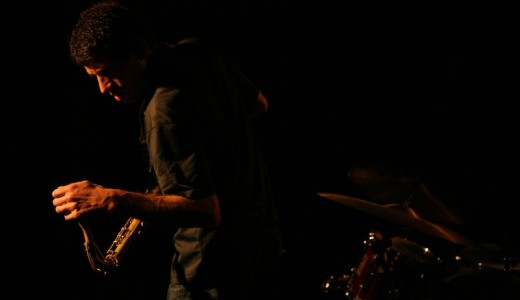Stephen Gauci is not a “new” player on the scene. He has been working on his craft for a long time, yet far too many still need to hear his music and learn his name. To my ears, Gauci is one of the best tenor saxophonists playing today, not only in New York (where he resides) but anywhere. I have been listening
to his music with attention for a while now but have not heard everything in his voluminous output. Gauci is releasing so much music in a period of sustained inspiration and creativity, so I wanted to reach out and ask him some questions.
I asked Stephen about the development of his big sound on the tenor saxophone, the tone, flow and density of his music. The intensity of Gauci’s playing often feels like he is trying to blow the ceiling off the room. “Right from the start, I had to have a big sound. Charlie Leeds (Stephen’s saxophone teacher) told me to play as loud as possible, all the time (in the beginning). This was to open up my throat. Refinement could come later. However, I never let that go. Over the past 15-20 years, I have gotten deeply into overtone manipulation, and that is a big reason why my sound is, well, mine. Overtones mean playing
from one’s voice box. I’m all about sound.” It is easy to hear what Gauci means by this when listening to his music. In a fountain of recorded activity stretching back to about 2018. Gauci often starts loud and stays loud without any loss of diversity, dynamics or space and time for his fellow musicians. In fact, one of my favorite things about Gauci’s music is his deep listening, the way he interacts with highly sensitive responsivity in diverse settings of so many different players. Therefore, I was shocked to learn that
Gauci had profound hearing loss from a childhood illness. I asked him to elaborate on the relationship of h is hearing loss tohis music. How does hearing loss shape his approach? “Most people don’t realize that I am essentially legally deaf. I lost a lot of my hearing when I was nine years old. It was intense. My first day back at school (after a month of hospital visits), I remember not being able to hear anything. The teacher put me in the front row and had another student tap me on the shoulder to point to my ‘chore’
on the board for the week. I couldn’t hear the teacher. Nine years old is when social skills are developing and I became isolated, always watchi ng all the other kids from a distance. When I started saxophone at 14, I went crazy practicing. I could hear saxophone! Still, it takes all my focus and concentration to hear -to hear people talk even in a casual conversation requires strenuous effort. My level of focus when I play is off the map. When I’m on stage, I turn my hearing aids low so l can only hear the musicians surrounding me on stage; I cannot hear the audience. It’s justthe music and me. Always been that way. This is why my phrasing, my sound, and general conception are unique; I really am ‘different.’ I hear d ifferently, I act differently on a social level. It’s real.” Considering his massive recorded output,vGauci strikes me as a nonstop force of music. I asked him about his purpose and mission with this high level of activity, much of which he documents on his label, Gaucimusic. “I realized that no matter how I played,
even if I were Coltrane reincarnated, nobody would acknowledge it. The idea with the Gaucimusic label is that my needs as an artist and the needs of the music are what determine the recorded output. I put out this amount of music because it comes out. When it stops, I’ll stop.”
I hope it never stops! I recommend that readers check out Stephen Gauci’s music on his website or bandcamp.com and suggest his trio album with Adam Lane on bass and Kevin Shea on drums, Live at the Bushwick Series (2019). This album features a single 30-minute piece of music by one of Gauci’s longer- standing working trios in top form. Lane and Shea are brilliant musicians and the trio is simply smoking. The album offers a short but deep dive into the big sound, focus and determination of some of the best freedom music happening anywhere today. *
– Richard Gilman Opalsky, Activator Magazine, June 2022